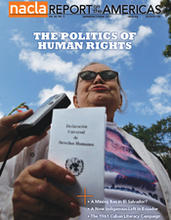This Week Online:
Nazih Richani: The World Bank Development Report and the Colombian Conflict
The 2011 World Bank Development Report focused on examining the role of organized violence and its impact on development in Colombia. However, the recommended policies in the 2011 report will not be enough to end the country's violence.
Michael Fox: The Voices of Support for Occupy Wall Street
On November 17, the two-month anniversary of Occupy Wall Street, occupiers and supporters took to the streets of New York City for a day of action.
Emily Achtenberg: A Political Victory for Bolivia
The new "framework agreement" restoring diplomatic ties between Bolivia and the United States represents a significant political achievement for Bolivia, as well as a victory for Foreign Minister David Choquehuanca that could help to strengthen Bolivia's "process of change."
Richard Boren: Ciudad Juárez Is Not Only Violence
Books like Murder City, by Charles Bowden, are a double-edged sword, drawing much needed attention to the violence in Ciudad Juárez. However, life does go on in Juárez, and not only that, it is a place where cross-border solidarity is more necessary than ever.
Martín Schorr: Argentina: Beyond the 'High Dollar'
Argentina has experienced record economic growth, and the devalued peso, or the "high dollar," as it is known, is at least partially responsible. But while this financial strategy is widely accepted in Argentina across the political spectrum, it has been profoundly limited.
The Human Rights Issue:
Lorraine Bayard de Volo, a political scientist who focuses on women's political mobilization and the history of feminism in Latin America, looks at Cuba's Damas de Blanco, and how WikiLeaks documents have linked them with the support of powerful allies, including the U.S. government.
International relations scholar Arturo López-Levy discusses the centerpiece of U.S policy toward Cuba, the Helms-Burton law, which mandates a "soft" approach to bolstering civil society and "democracy promotion" in Cuba, while causing many humanitarian concerns.
Anthropologist Nicole Fabricant sketches a critical portrait of Bolivia's aggrieved regionalist right-wingers, who today assert themselves as the victims of a totalitarian regime under President Evo Morales.
Gregory Wilpert, a sociologist and frequent commentator on Venezuelan politics, argues that the right has successfully harnessed the power of the country's political polarization, staging protests and other actions that are deliberately calculated to provoke conflict and create spectacles in which the Chávez government will react in a heavy-handed manner.
Finally, NACLA editor Michael Fox interviews Bertha Oliva, a leading human rights activist in Honduras. Her organization, COFADEH, was founded in 1982, just as the Reagan administration was discovering human rights to be the potent rhetorical weapon it is today.
NACLA's Digital Archive:
Now that we are approaching our 45th anniversary, don't forget to visit our archive and read the award-winning articles that have made the NACLA Report on the Americas the most reliable resource for progressive politics in the region. Subscribers and customers can now download PDFs of full issues!
Stay tuned for upcoming interviews, event announcements, and previews.
|



Your subscription is vital to our work. Support NACLA today by subscribing to the award-winning NACLA Report.

NACLA Needs Your Support! 
Visit the NACLA Store to purchase back issues of the Report, books, and more.

To unsubscribe please reply to this e-mail with "unsubscribe" in the subject line.
|